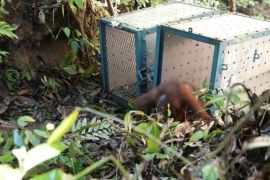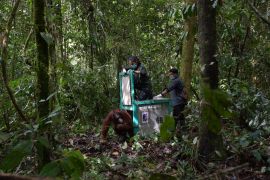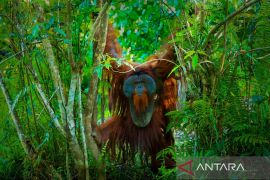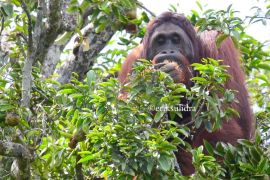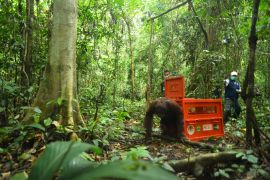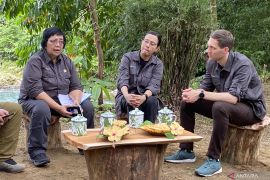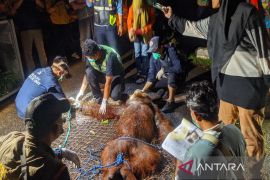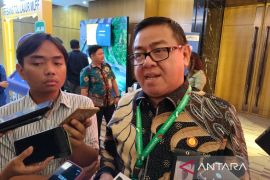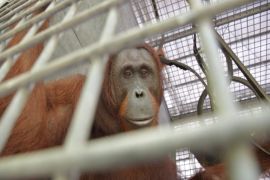The habitat is already split by national road but experts and environmental activists have found three potential bio bridges that could be developed to connect the habitats of the Tapanuli orang utans, chairman of the Forum of Conservation of Sumatra Orang Utans (Fokus) Kusnadi Oldani said here on Friday.
Bio-bridge is a corridor between forests built to protect fauna facing threat of extinction on split of forests as a result of exploitation such as illegal hunting and unsustainable timber industry , construction of various facilities and infrastructure and mining industry.
In answer to question whether there is still possibility to develop bio bridge after the the construction of the PLTA Batang Toru, Kusnadi said he had not found a reference to give a "yes or no" in this case.
The idea to develop three bio-bridges for the conservation of ecosystem in Batang Toru was already initiated by experts and local and international environmental conservation activists even before the existence of the new species of Tapanuli orang utans was known, Kusnadi said.
He said he feared with the construction of the hydro power plant with high voltage cables, the plan to develop bio bridges in Batang Toru would likely fail.
Development of bio bridges was a project designed after the discovery of orang utans in separate ecosystems areas in the districts of Tapanuli Utara, Tapanuli Tengah and Tapanuli Selatan.
The bio bridges could connect the habitats of orangutan and other fauna in the nature preserve forest of Dolok Sipirok and protected forests and other forests in Blok Barat.
Executive Director of Walhi (an environmentalist non governmental organization) of North Sumatra Dana Prima Tarigan said the PLTA project is located three sub-districts -- Marancar, Sipirok and Batang Toru in Tapanuli Selatan, North Sumatra.
A number of dams would also be built to hold river waters for the PLTA projects.
The population of Tapanuli Orangutans, the third species of orang utans found in the country after Pongo pygmaeus (in Kalimantan) and Pongo abelii (in other areas in Sumatera) is estimated to be around 800.
Earlier, the Indonesian Chamber of Commerce and Industry (Kadin) of North Sumatra said construction of PLTA Batangtoru is a solution to energy crisis in that district.
"Apart from meeting power requirement, the PLTA would help the government to protect the environment," Deputy for Energy and Mineral of the North Sumatra`s Kadin Tohar Suhartono said in Medan recently.
Tohar said with energy from PLTA Batangtoru, which has a capacity of 510 megawatts, the government could save fund for leasing power generating vessel, which has been stationed in Belawan so far to meet energy requirement in North Sumatra.
PLTA Batangtoru could help prevent environmental damage as hydro electric power plant is environmentally friendly, he said.
He said the business sector and investment could not expand in North Sumatra because of shortage in power supply.
"There is no reason not to support or not to approve the PLTA Batangtoru project," he said, adding investment has to be protected to maintain the confidence of investors.
Environmentalists have strongly criticized the plan to build the PLTA as it is feared to cause the extinction of the Otang utan species.
Director General of Conservation and Natural Resources and Ecosystem (KSDAE) of the Environment and Forestry Ministry (KLHK), Wiratno said that KSDAE would continue to create synergy between the interest of conservation and development of the PLTA Batangtoru.
KLHK would continue to coordinate with the Energy and Mineral Resources Ministry to ensure that construction of the PLTA would not affect in anyway the Orangutan habitat.
The Batangtoru ecosystem occupies an area of 110,000 hectares managed by 11 Forest Management Units (KPH).
Wiratno said the proposal to stop the PLTA project was a wrong move as PLTA Batangtoru is a strategic project which would contribute greatly to community development and economy of that district.
Reporting Virna P Setyorini/Evalisa Siregar
Editing by A Saragih, Otniel Tamindael
Reporter: Antara
Editor: Andi Abdussalam
Copyright © ANTARA 2018

